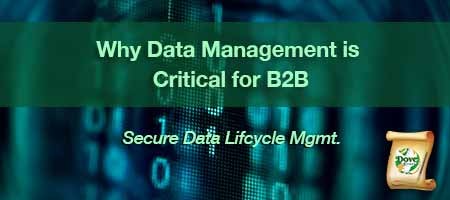Why Data Management is Critical for B2B
Welcome to the Dove Direct Print and Marketing Blog. Today's post, "Why Data Management is Critical for B2B," provides an update on managing data and why B2B organizations should be cognizant of the ramifications that arise due to a lackluster data collection and management system. Big data is now indispensable for both B2B and B2C. Without accurate data and secure data storage, serious challenges can occur, leading to a drain on the brand both in terms of finances and equity. Data breaches heighten in frequency and technological prowess by those seeking to disrupt or steal data to impact brands and customers negatively.
Before we dive in, we would like to wish all who celebrate Good Friday and Easter a safe and enjoyable holiday week. Now that we are in the second quarter, and the economy and pandemic management through vaccinations is progressing, let's remember to adhere to the CDC guidelines so that the progress we are making doesn't reverse.
Quote of the Day: "Think analytically, rigorously, and systematically about a business problem and come up with a solution that leverages the available data." – Michael O'Connell, Chief Analytics Officer, TIBCO
Over the last several years, both B2B and B2C organizations have become much more reliant on big data. Both strategies embrace gathering and disseminating data for growth, market conditions, R&D, customer experiences, and of course, sales and marketing concerns. What comes of age and circumstance is the way organizations secure, handle, and protect data.
Data Privacy is Critical for B2B
For B2B, data protection, security, and privacy are essential components that can protect both the organization and the customer. Most brands continuously deal with massive amounts of data, most of which is self-generated. Further, most B2B businesses grapple with effective data management coupled with data mining.
In today's digital landscape, often rife with attempts to hack and steal data, managers must take extra care to protect the customers' privacy and data security. Several regions of the world now deal with various privacy regulations and legal parameters based on specific geographies.
All companies that deal with B2B marketing data must comply with privacy laws and regulations per the region where the work takes place and, in many instances, where compliance regulations differ. Therefore, B2B data management needs to have a firm grasp on secure data lifecycle management.
What "Legitimate Interest" Means
Legitimate interest is a term that matters and represents what is behind the GDPR (general data protection regulation) construct. If your brand does not do business with the EU, you may not be aware of the GDPR's importance. In short, (GDPR) is a legal framework that sets guidelines for the collection and processing of personal information from individuals who live in the European Union (EU). This term typically focuses on the permission of processing an individual's data as it resides under the legitimate interest of a business.
Businesses that process data can apply the GDPR guidelines reasoning for the following conditions:
- A clear benefit to their businesses is evident through the shared data.
- The privacy of the individual is hampered to the minimum.
- The expectation of the business could be reasonable about sharing the data for this purpose.
It is extremely important to maintain records of individuals' data when the brand employs legitimate interest to process it. In addition, brands should also keep an individual's personal information if they have permission to do so.
8 Rules for Consent and Legitimate Interest
According to Deck7, there are 8 Rules which they suggest are essential to follow, whether using the GDPR or not. They are:
- A clear and accessible Privacy Policy needs to be checked.
- If people wish to Opt-out, provide clear opportunities for them.
- Respecting your Opt-outs, make sure you remove them from your emailing lists.
- The content sent from you should be relevant to what people sign up for and request. And that your content is compliant with all legal and ethical standards.
- Do not email too frequently.
- Vulnerable individuals are not supposed to be targeted.
- If you plan to do something new, check once if that fits into all the legal and ethical boundaries.
- Retaining data should be recorded and should be justified when needed.
Keep in mind that differentiating variables exist between business data and personal data. Further, both reside under the Big Data umbrella. Nonetheless, best practices suggest that data handling and manipulation should be approached with the same consciousness and care, whether business or personal data. To mitigate doubt with a customer, the brand should obtain active consent from the individual before adding him/her to an email list, and more importantly, before retaining any data. You may receive an inquiry for this information, so be prepared, and you should have a process to delete that data when and if the time comes to delete or scrub files.
Organizations must provide the utmost care regarding people's privacy and sensitivity concerning personal data usage. In addition, brands also need to understand the data privacy policy at all times, and more importantly, the data policies of states, regions, and countries the brand is operating within. Data policies do vary based on regions and states.
New Data Compliance Laws
Even though the US has yet to adopt a GDPR standard, or at least a version of the GDPR framework, just about every country is looking to set new data compliance standards; therefore, brands should keep a close eye on data standards compliance updates and changes.
For example, California passed the CCPA (California Consumer Privacy Act) on January 1, 2020. The CCPA stipulates that any for-profit entity doing business in California which meets any of the following items must comply with the CCPA:
- Gross revenue greater than $25 million
- Buying, receiving, selling, or sharing personal information of more than 50,000 customers, households, or devices for commercial purposes on an annual basis
- By selling customers' personal information, it derives 50% or more of its annual revenues
- If other businesses are controlled or covered by you
- If common branding is shared, such as name, service mark, or trademark with covered business
While other states are reviewing these standards, Maine and Texas are now defining new data compliance standards.
Why Data Privacy Matters for B2B
The B2B industry traditionally operates with whatever amount of data they have on hand. B2B organizations are known to possess data of a potential customer located anywhere on the globe. That said, data management is an asset of any business and contains a direct path toward customer loyalty. Customer trustworthiness is an important factor for brand loyalty, so brands need to maintain data privacy in the B2B sector. When a brand fails to adhere to data privacy norms and compliance standards, legal action could be forthcoming.
Selecting a Data Compliance Partner
In the event your organization is looking to find a secure data lifecycle solution partner, the following list represents the checkboxes necessary to begin the selection process:
- Secured VPN & SFTP access for sensitive data.
- Sensitive data is encrypted while being stored on secured servers.
- Audit and log continually any physical & logical access to data.
- Access to the data centers & printing centers is controlled and audited.
- The Computing Infrastructure & Servers are hosted in a SAS 70 Compliant Data Center.
- For highly confidential transactional data, the vendor can provide a trustworthy computing & processing infrastructure.
- The Computing & Printing Infrastructure are interconnected using state-of-the-art CISCO VPN & Firewall appliances.
- Adherence to industry-standard processes & practices for data governed by compliance such as HIPPA, SOX, and others.
- Once the project is complete, the processed data can be delivered back to the customer securely or securely purged from the vendor's servers.
The Net-Net
Big data is here to stay, and compliance standards are evolving and changing. These changes help to meet the times where customer's trust leads the way for improved brand equity. Should you need an organization to partner with Secure Data Lifecycle Management solutions to deliver VDP, printing, scanning, and mailing, contact Dove Direct. We would be pleased to work with you. Thanks for stopping by and taking a moment to read "Why Data Management is Critical for B2B."
Let's have a conversation about integrated business solutions and how they can help grow your business, change behavior, and improve the customer experience. Let us show you how to improve your document processes to optimize your workflow, reduce your costs, and maximize your organization's printing, letter shop, and mailing capabilities. Dove Direct does have an official USPS certified bureau located within our offices that will save you time and money. We can even create a demo file for you.
For more information, call Carla Eubanks at 404-629-0122 or email Carla at This email address is being protected from spambots. You need JavaScript enabled to view it..
Dove Direct, your Atlanta based print and mail solutions provider, offers organizations end-to-end data, printing, and mailing solutions:
- Data Management
- Variable Digital Printing
- LetterShop and Fulfillment
- Fully Automated MLOCR Presort Bureau
- Marketing and Production Management Support
- Secure Data Life Cycle Management
If you don't want to wait, you can reach Dove Direct today by calling 404-629-0122 or use the Contact Form for Dove Direct.





